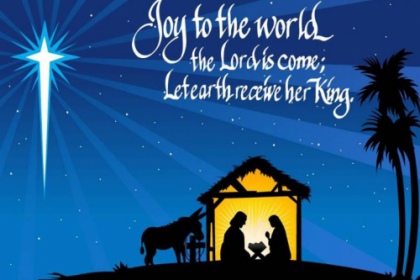
One day, a teenage girl in a little town of Palestine was visited by a stranger in shining clothes. “Do not be afraid,” he said. “I bring you good news of great joy that will be for all the people.” And that encounter, recorded in Matthew and Luke, is forever memorialized in the Nativity stories we see in Christmas Cantatas. More importantly, God entered human history to bring to the world his long-awaited blessing of salvation. Invariably, this story has inspired many works of literature and songs of celebration, not least the timeless Christmas Carol, “Joy to the World.” Written by pastor and hymn writer Isaac Watts in 1719, this cheerful song is a Christological interpretation of God’s final solution to the curse of the fall (Gen. 3:17-18), echoed in Israel’s messianic hope in Psalms 96:11-12 and 98. Understood in light of what God was accomplishing, indeed, the birth of Christ was “good news of great joy for all the people.”
However “kwa ground,” things were very different.
At this time, the people of Israel are living in anticipation of political emancipation from what Zechariah sees as “the hand of all who hate us” (Luke 1:71). The socio-economic inequalities between the poor and hungry commoners, and the rich and mighty elites needed divine intervention (Luke 1:53). Hearing prophetess Anna’s testimony, one could say that the collective longing for the “redemption of Jerusalem” is personified by this long-suffering widow (Luke 2:38). At the end of Luke, we find two disciples retreating to Emmaus, in a conversation reflecting their disillusionment with Jesus, for “[they] had hoped that he was the one to who was going to redeem Israel” (24:21). But soon, this hope is restored after their eyes are opened: the risen Christ and Lord is right before them (24:31). In an ensuing crash course on Old Testament 101, Jesus helps them understand that his incarnation was not merely to achieve a national aspiration of emancipation, important as that was in a time of Roman oppression. No. Jesus had a much bigger, more inclusive mission: to bring the Abrahamic blessing of salvation to “all nations, beginning at Jerusalem” (Luke 2:30-31). This was truly a cause for rejoicing!
But–not everyone was rejoicing.
While the choirs of heaven praised God with their glorious melodies, the lowly Shepherds marveled and spread the news everywhere, and the Gentile Magi from the east worshipped and paid homage to the new born king, Herod himself “was disturbed, and all Jerusalem with him” (Matt. 2:7). But why? What was good news for the oppressed was a dangerous subversion, a “plague” of hope that threatened his illegitimate rule over Israel. Everyone knew he was not a true Davidic king; he was an ambitious puppet of Rome, bent on securing his own dynasty. His murderous campaign sought to stamp out any hope inspired by an alternative, rival king and kingdom. Unknown to him, the new born king was not interested in vying for president or governor in the next General Election; he didn’t need to. The time for the ultimate confrontation was not yet. In the meantime, Jesus had a greater mission of liberating the whole world from the grip of the curse of sin and evil, of which Herod’s regime was only a part. And he has invited us to be part of this great mission.
Or shall we rival him with our quest for personal kingdoms?
So, as animals lose their lives to garnish our festivities, let us not forget: Christ was born so he could lay down his life for us; for all people. Like Mary and Joseph, let us accept with courageous and obedient faith the honour of being channels of his blessing to the world. Like the Magi, let us unreservedly bow in worship and allegiance. Like Anna and Simeon, let us find consolation in him, as a foretaste of the ultimate fulfillment our hearts desire. And like the Shepherds, let us with a generous spirit and creativity spread the good news of God’s love everywhere. This is the real joy of Christmas.




